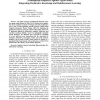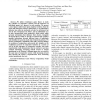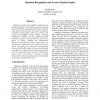IAT
2010
IEEE
13 years 9 months ago
2010
IEEE
The spread of information and emotion within groups is studied in models of social diffusion. Evidence has been found that the emotional states of humans affect their information ...
IAT
2010
IEEE
13 years 9 months ago
2010
IEEE
Abstract--The paper proposes a biologically-inspired cognitive agent model, known as FALCON-X, based on an integration of the Adaptive Control of Thought (ACT-R) architecture and a...
IAT
2010
IEEE
13 years 9 months ago
2010
IEEE
When its human operator cannot continuously supervise (much less teleoperate) an agent, the agent should be able to recognize its limitations and ask for help when it risks making...
IAT
2010
IEEE
13 years 9 months ago
2010
IEEE
Abstract--There has been growing interest in creating intelligent agents in virtual worlds that do not follow fixed scripts predefined by the developers, but react accordingly base...
IAT
2010
IEEE
13 years 9 months ago
2010
IEEE
Computational trust systems are getting popular in several domains such as social networks, grid computing and business-to-business systems. However, the estimation of the trustwo...
IAT
2010
IEEE
13 years 9 months ago
2010
IEEE
IAT
2010
IEEE
13 years 9 months ago
2010
IEEE
Research on opinion detection has shown that a large number of opinion-labeled data are necessary for capturing subtle opinions. However, opinion-labeled data, especially at the su...
IAT
2010
IEEE
13 years 9 months ago
2010
IEEE
Abstract--The development of large-scale distributed multiagent systems in open dynamic environments is a challenge. System behavior is often not predictable and can only be evalua...
IAT
2010
IEEE
13 years 9 months ago
2010
IEEE
We utilize evolutionary game theory to study the evolution of cooperative societies and the behaviors of individual agents (i.e., players) in such societies. We present a novel pla...
IAT
2010
IEEE
13 years 9 months ago
2010
IEEE
Intention recognition has significant applications in ambient intelligence, for example in assisted living and care of the elderly, in games and in intrusion and other crime detec...




